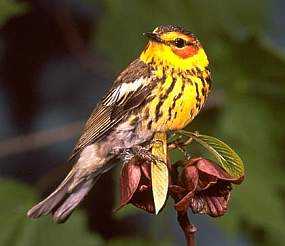I maxed out last week. Every day filled with activity and left me scurrying from place to place like a squirrel on amphetamines. I swore at one point I heard a hummingbird yell, “Dude, slow down! You’re like wearin’ me out.”
Around dusk last night and late this afternoon, I took a break in my favorite place, the outdoors. My halcyon time of the year is that holy month of days between mid-May and mid-June. The late spring grows pregnant with possibility for the upcoming summer. Hallowed days swell with life. The sky pulses cerulean. The trees fluoresce with green.
I picked up my binoculars, hoping to catch some stragglers on the spring warbler migration.  While showing my son a Red-winged Blackbird atop one of our sycamores, I happened to spot a Cape May Warbler. On my own property! My neighbor across the street, an Audubon Society local president, blew my mind when he said he saw one of these uncommon birds in his stand of pines last year. Not having a Cape May on my life list, I thought I’d lost my opportunity forever. But it showed up when I least expected it.
While showing my son a Red-winged Blackbird atop one of our sycamores, I happened to spot a Cape May Warbler. On my own property! My neighbor across the street, an Audubon Society local president, blew my mind when he said he saw one of these uncommon birds in his stand of pines last year. Not having a Cape May on my life list, I thought I’d lost my opportunity forever. But it showed up when I least expected it.
Saw a Wild Turkey, too. It’s nice to know America’s bird is coming back. I’ve seen more in the last three years than in the previous twenty-five.
A Rose-breasted Grosbeak surprised me, since I hadn’t seen any on our property before. You tend to see more of them in winter in Ohio, but this one happily flitted through the canopy blissfully unaware of his being out-of-place in May.
An Eastern Wood Pewee hunkered on a spare limb by our pond…patience, patience. Then, zip! Snared a moth mid-flight. Back to the branch. Waiting….
Two Flickers tended their nest in a hole in an ash tree. Yellow Warblers, a Myrtle Warbler, a Yellow-breasted Chat, then pow—the eye-socking sight of the setting sun catching a Baltimore Oriole’s tangerine feathers. Two happy Chipping Sparrows watched me as they hopped around our gravel driveway, scouting for food, chipping as they searched.
Later, I left our forest, walked back to our porch, and pulled up a chair to watch the half acre of trees nearest our house, looking for tiny flashes of movement in the increasingly dense canopy. Here, the locust trees come late to the spring show, fighting with the walnuts to be the last to leaf. I hear the “drink your tea” of a Towhee, spot a Red-bellied Woodpecker as it digs for bugs wedged in tree bark, and hear a tiny Chickadee—its weight not more than a nickel, dime, and quarter together—scolding all 215 lbs. of me. And I’d probably lose that fight, too.
I saw a Cerulean Warbler a couple weeks ago, and I guess the reference to that color should bring me out of my reverie and back to the blog. People don’t want to read about a bunch of birds, do they? No time. People come here to skim some hard-hitting commentary on the latest ecclesiastical buzz, right?
A wise man once wrote,
Four things on earth are small, but they are exceedingly wise: the ants are a people not strong, yet they provide their food in the summer; the rock badgers are a people not mighty, yet they make their homes in the cliffs; the locusts have no king, yet all of them march in rank; the lizard you can take in your hands, yet it is in kings’ palaces.
—Proverbs 30:24-28
I don’t know what happened to wonder. It seems to be in short supply today. In a disposable world where people toss cigarettes and half-eaten bags of fast food out their car windows while on their way to their next appointment, I suppose there’s not much place for wonder.
Wonder goes missing in busyness. Spring warbler migration? What? When? Oh, I’ll pencil that in my calendar for next year, I promise.
Entertainment tramples wonder, since wonder may not be as flashy, not as trendy, not as immediate. Wonder takes a little work. Just a little.
We might not see wonder, but we do see truckloads of pragmatism in our churches. We can teach and preach and prophesy on how to have a great marriage, but most people will leave without any sense of wonder at the person sitting next to them on the drive home. We can spend an hour in worship, yet the second the last note dies out in the sanctuary rafters, we’re scanning our bulletins to see what’s next, hoping that the sermon won’t be too dry or lengthy.
Because we don’t wonder, we don’t pray. We already know what God’s like. Jesus won once and He’ll win again. Yadda, yadda, yadda. Hope He comes back soon—but not too soon. Amen.
When wonder goes missing in our churches, answers replace it. Not questions, just answers. Questions accompany the first signs of wonder, especially when the answers for those questions don’t come easily. And where wonder reigns, sometimes neither answers nor questions matter, only the wonder.
I wish I saw more wonder in American Christians. I suspect that many of us are too caught up in living our best life now to wonder at the way the Wood Pewee pirouettes in space to outmaneuver a zigzagging moth. Or how the craters on the moon form patterns. Or how the brook teems with tadpoles, mayflies, and tiny fish. What are the names of those fish? Does it matter?
I think it matters. I think we’ve lost something in the last hundred years in this country. Our wonder’s fled. I think it’s one reason why so many people take psychoactive drugs. Strip away the wonder and the world turns frightening, cold, and distant. It becomes the enemy. Life takes on a winner-take-all mentality where some win and others lose, and God help us if we’re not one of the winners. Now pass the damned Zoloft, thank you very much.
I think a loss of wonder means it’s far easier to take a gun and shoot at cars passing by. I believe a loss of wonder makes it that much easier for an angry husband to take a fist to his wife’s face. I know that a loss of wonder makes us shallower people.
Loss of wonder is a sin.
We won’t hear that sermon on Sunday, though. Because if we did, it would mean we’d have to start dealing with our culture, a culture that successfully murdered wonder and got away with it. Nothing pains me more than to hear some five-year-old say, “Ah, it’s just a stupid old bird.” Because I know that any child who says that will one day grow up to say, “God? What do I need God for?”
Something to wonder about.

 While showing my son a Red-winged Blackbird atop one of our sycamores, I happened to spot a Cape May Warbler. On my own property! My neighbor across the street, an Audubon Society local president, blew my mind when he said he saw one of these uncommon birds in his stand of pines last year. Not having a Cape May on my life list, I thought I’d lost my opportunity forever. But it showed up when I least expected it.
While showing my son a Red-winged Blackbird atop one of our sycamores, I happened to spot a Cape May Warbler. On my own property! My neighbor across the street, an Audubon Society local president, blew my mind when he said he saw one of these uncommon birds in his stand of pines last year. Not having a Cape May on my life list, I thought I’d lost my opportunity forever. But it showed up when I least expected it. He chose superb violin works unperformable by the less skilled. He played masterfully for the commuters.
He chose superb violin works unperformable by the less skilled. He played masterfully for the commuters.